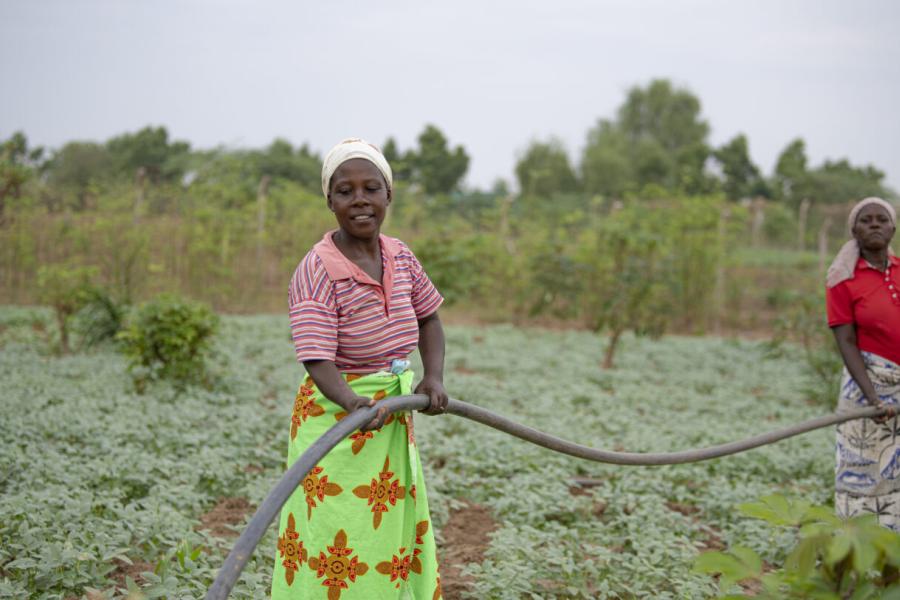Hope for women as farming project bears fruit in Kenya

Manirakiza, a refugee farmer happy with her harvest for the day. She sells her harvest in the local markets and occasionally employs other refugees and Kenyans
Manirakiza and other farmers are busy plowing their piece of land in perfect sync, occasionally pausing to greet the other farmers. The Burundian refugee’s routine has been the same since she was allocated the piece of land at the Choro farm five years ago.
“I didn’t think farming would be possible in such dry climate,” she says. “Every day, people mocked us and thought we were crazy; some people gave up.”
The 35-year old’s concerns were not unfounded – Kakuma lies in a semi-arid region of Northwestern Kenya with little rainfall.
But she believed that the farm would flourish, given the right farming approach. It took her and her husband one month to clear the shrubs and prepare the ten by ten-meter land. After she fled Burundi’s conflict, Maniirakiza and her husband arrived at Kakuma refugee camp with no other skills than farming. They had to use cash assistance for basic needs provided by UNHCR, the UN Refugee Agency and the monthly food ration from the World Food Programme.
“It was difficult to sustain our family with the ration provided as we had to ensure it lasted a whole month,”she recalls. “It’s even more difficult for a mother, trying to convince her children to eat less food.”

UNHCR implements collaborative programs that embed the government-led Kalobeyei Integrated Socio-Economic Development Plan (KISEDP) approach. Four years later, through KISEDP, UNHCR worked with livelihood partners, development actors, specialized agricultural agencies and the Turkana County Ministry of Agriculture to pilot the first phase of the Choro farms, started in 2017 as a one-acre model farm.
“The project was started to ensure food security for refugees and their hosts and to improve their nutrition and increase income-generating opportunities for families and the entire community,” explains Edith Ingutia, UNHCR’s Assistant Livelihood Officer based in Kakuma.
In 2017, the farm was expanded to 15 acres after the pilot proved successful; sunken beds had reduced water loss and farming was more sustainable. To promote social cohesion, local Kenyans and refugees were provided pieces of land and technical material assistance to improve farming.
Sunken beds are an essential technique in Kakuma as they help in binding soil particles, improving the soil texture, and reducing water loss due to dryness. In the rainy season, farmers use generators to pump water to their farms from the seasonal rivers, and in the dry season, they use shallow wells and solar-powered pumps.
Currently, there are eight shallow wells in the farm. A committee of five farmers, including Manirakiza, oversees each well to ensure their long-term sustainability by collecting money to ensure they are fixed whenever they have a problem.
Manirakiza is reaping the fruits of her labour and commitment to the project – she has harvested vegetables, which she sells in the local markets. She occasionally employs other refugees and Kenyans to help her care for the farm.
She is thankful that her family now has more food and eats more vegetables, thus improving their nutrition.
“I’m glad I didn’t give up on this farm. It has given my family and myself a better life.”
This story was first posted at UNHCR Kenya





